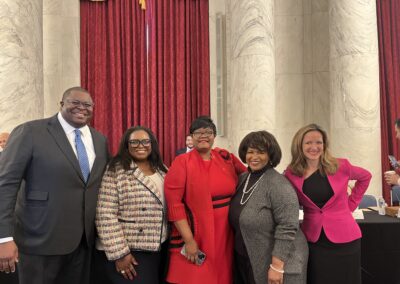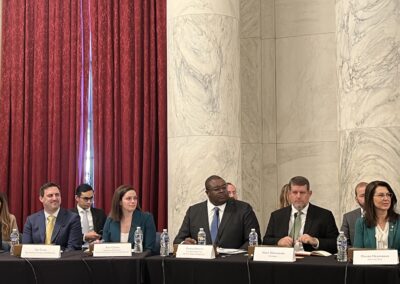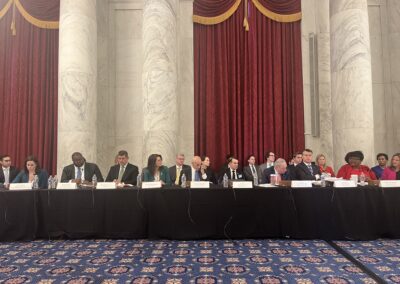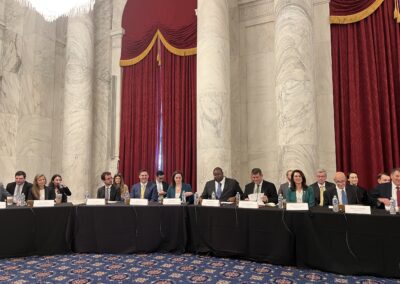Damon Hewitt’s Statement to the U.S. Senate’s AI Insight Forum on “Elections and Democracy”
I. Introduction
Leader Schumer and Senators Rounds, Heinrich and Young, my name is Damon T. Hewitt, and I am the President and Executive Director of the Lawyers’ Committee for Civil Rights Under Law (“Lawyers’ Committee”). Thank you for the invitation to this AI Insight Forum and for the opportunity to submit a statement today on the impact of Artificial Intelligence (AI) on elections and democracy.
The Lawyers’ Committee is a nonpartisan, nonprofit organization, formed in 1963 at the request of President John F. Kennedy to mobilize the nation’s leading lawyers as agents for change in the Civil Rights Movement. Today, we use legal advocacy to achieve racial justice, fighting inside and outside the courts to ensure that Black people and other people of color have voice, opportunity, and power to make the promises of our democracy real. Our work is directly relevant to the topic of this AI Insight Forum. Our Digital Justice Initiative works at the intersection of racial justice, privacy, and technology, to address predatory data practices, discriminatory algorithms, and other online harms that disproportionately affect people of color. Our Voting Rights Project addresses misinformation, disinformation, and voter intimidation1; advocates for reforms to improve access to the ballot; and provides resources and direct assistance to voters. And we serve as convenor of the Election Protection coalition—the nation’s largest nonpartisan voter protection effort. consisting of over 300 national, state, and local partners working to ensure that historically disenfranchised communities have equal access to vote, have their vote count, and can participate in democracy. Election Protection administers a suite of voter protection hotlines in multiple languages, including 866-OUR-VOTE. The Lawyers’ Committee also recruits, trains, and deploys thousands of volunteer attorneys to provide reliable voting information and assist voters when they encounter problems. As necessary, Election Protection escalates reports it receives to election officials, law enforcement, or social media companies. The Lawyers’ Committee has submitted complaints concerning online election disinformation and other forms of voter suppression to federal agencies such as the FBI, DOJ, and FCC.2
What we have seen though our work demonstrates how racial justice, voting rights, and technology are inextricably linked. Voters of color already face disproportionate barriers to the ballot box that make it more difficult and more costly for them to vote without factoring in the large and growing cost of targeted mis- and disinformation on our communities. And in present election cycles, Black Americans have been specifically targeted by disinformation campaigns3. AI technology threatens to turn already fragile conditions for our democracy into a perfect storm. The spread of misinformation and disinformation online to influence elections and disenfranchise voters, often specifically Black voters, is already commonplace.4 Communities of color who already sacrifice so much to cast a ballot and make our democracy work are increasingly subjected to new downsides of technological innovation without reaping the rewards.
We expect generative AI to rapidly advance the pace at which mis- and disinformation can materialize—to create deep fake videos or voice cloning which jeopardizes trust in real media, to disguise and spread online hate and white supremacist content, and for biased algorithms in social media feeds to amplify it— all at the direct expense of Black and Brown people. But it does not have to be this way. Congress must quickly and seriously see to the task of regulating AI, so that technological innovation can empower instead of cause harm.
II. Past as Prologue: Disinformation and Misinformation Targeting Black and Brown Communities in National Coalition on Black Civic Participation v. Wohl as Illustrative
One of our current lawsuits offers a glimpse into the future, showing how rapidly tech and AI advancement can multiply the amount of harm caused to our democracy. In the weeks before the 2020 Election, the Election Protection hotline received complaints from voters about robocalls using deceptive information to discourage people from voting. After investigating, we found that two individuals, Jack Burkman and Jacob Wohl, had sent 85,000 robocalls largely to Black Americans to discourage them from voting by mail, falsely alleging that their personal information would be part of a public database used by police to execute warrants; by credit card companies to collect debts; and by public health officials to force mandatory vaccinations. These threats played upon systemic inequities likely to resonate with and intimidate Black Americans. We filed a lawsuit, National Coalition on Black Civic Participation v. Wohl, in which a federal court issued a restraining order to stop the robocalls and later ruled that this conspiracy to silence Black voters was intimidating, threatening, and coercive in violation of the Voting Rights Act and Ku Klux Klan Act.5
The methods used for those deceptive robocalls in 2020 look primitive by 2023 standards, but they hold three important lessons for democracy when surveying the AI technology of today and tomorrow.
First, the ability to micro-target populations, particularly Black and Brown voters, is possible for even unsophisticated actors. In 2020, Burkman and Wohl targeted Black voters by routing robocalls to “historically Black” zip codes and using a Black voice actor as a disarming technique. If the same scenario were to occur in the near future, bad actors could buy targeted lists of Black voters based on online, commercially available data for as little as 8 cents a person.6 Predictive AI technologies could be used to refine and test this data to generate targeted lists of voters based on the patterns, interests, and behaviors of specific individuals. Forget using zip codes as a proxy for race; the targeted lists of tomorrow will weaponize sophisticated machine learning technologies, using individual identities or behaviors to target Black voters with surgical precision, all in order to mislead and harm them.
Second, the ability of AI technologies supercharges the effectiveness and the ease of deploying misleading communications. The bad actors we sued were able to hire a voice actor to record a script for a few hundred dollars and distribute robocalls 85,000 times for only $1000. The Senate Select Committee on Intelligence found that when the Kremlin sought to specifically suppress Black turnout, it used conventional online advertising tools available to anyone, as well as thousands of fake accounts, to exacerbate discord and deceive Black voters.7
Today, bad actors could use generative AI to write, produce, and record customized misinformation in numerous languages based on the communities they are targeting, and they could do so almost instantaneously. The AI models likely to run in 2024 will already absorb and recreate worldviews from their training data which is prone to stereotyping and abusive language without intervention. In malicious hands and absent strong regulation, AI can clone voices so that calls sound like trusted public figures, election officials, or even possibly friends and relatives. The technology could reach targeted individuals across platforms, following up the AI call with targeted online advertisements, fake bot accounts seeking to follow them on social media, customized emails or WhatsApp messages, and carefully tailored memes.
Beyond the alarming ease of dissemination, the content of AI-powered media holds untapped potential to disrupt our democracy. It can be used to deceive or intimidate voters into not voting, generate violent hostility toward election workers, bolster the message and recruiting of white supremacist organizations, and undermine trust in election outcomes. Such actions not only destabilize the election process itself, but also enable intimidation of voters and election officials alike, undermining the public’s trust in the outcome of elections.
Picture the “October surprise” when days before an election every conceivable candidate is made the target of a deep-fake video or audio recording using racial slurs, or endless customizable versions of a Willie Horton-type ad blatantly pandering to racial stereotypes.8 Deceptive messages may happen too fast to be debunked: what if a fake robocall or text message on election day falsely tells voters that a polling place has lost power and is shut down and the election is postponed until tomorrow? How can we prevent voter disenfranchisement in such a case or remedy it if it does occur? These risks damage the very ability to hold credible campaigns, degrades voters and public messaging, undermines trust, and furthers white supremacist agendas.
The third and final warning of NCBCP v. Wohl for all of us who care about democracy is the way in which a lack of social trust can be weaponized against our very ability to make informed decisions in our democracy. The charlatans we sued claimed they were calling from a civil rights organization they dubbed Project 1599. They sought to trade on the credibility of established civil rights organizations and use a combination of past injustice and present-day fears to disempower communities of color and dissuade them from voting.
This is a lesson for the future. AI can use our own beliefs to erode trust in a better future. AI tools can provide the same type of online power and influence as the Kremlin to virtually anyone with a laptop. Small groups and individuals motivated by hatred will be able to replicate schemes that once required large and sophisticated operations. The more AI generates lies, the more truth becomes harder to decipher. Truthful content crucial for making informed choices in our democracy will be routinely dismissed as fake when the facts are inconvenient for certain agendas. Entire communities will face a torrent of online hate and disengage online. The fear is that ultimately targeted communities will tune out of our democracy entirely.
III. Solutions
The speed of technological advancement has outpaced the output of our democratic institutions. The problems of AI are here. Its promise is elusive. Achieving the potential of AI requires Congressional action and corporate accountability.
We need those who make and profit from AI systems to take steps before the election. Like any other product, AI tools should not be made available if they are not safe. AI services like ChatGPT must have effective policies and safeguards against generating misinformation and must block the service from being used for that purpose. Companies also have a responsibility to not hand the keys of online platforms and AI to those with a track record of deliberately misleading. For example, election deniers should not be allowed back on YouTube just as sophisticated AI tools are poised for use. We also need federal agencies and law enforcement to be proactive in deterring those using AI from breaking the law. Post-hoc redress for disinformation that materially affects an election is woefully insufficient.
Congress must not ask voters and election officials to keep bearing these burdens without legislation in sight. We need bright-line rules, including guardrails on the development and deployment of AI technology. It’s also important that individuals and organizations can defend and vindicate their rights. No government in the world could quickly and easily evaluate each possible advancement in AI, nor bring every enforcement action—so to stop the next generation of bad actors, we need clear affirmative obligations on the developers and deployers of this technology to stop harm before it happens.
Five principals should guide AI regulation and legislation to protect our democracy:
- AI regulation should protect Americans’ civil rights, by including an anti- discrimination provision which applies to online contexts and algorithms.
- AI should be evaluated and assessed, both before and after deployment, for discrimination and bias.
- Developers and deployers of AI should have a duty of care requiring that the products they offer are safe and effective, and be liable if they aren’t.
- AI regulation should include transparency and explainability requirements so that we know when, how, and why, AI is being used.
- There should be data protection requirements, so that AI is not trained on the data of people who have not consented to it. Voter information should not be paired with private information to target voters without safeguards.
IV. Conclusion
Our democracy is too precious for lawmakers to be silent on civil rights and democracy protections while the tools of the future become the weapons of its demise. In 1963, Martin Luther King warned “the means by which we live have outdistanced the ends for which we live.”9 If we allow AI to wash over us without bold pro- democracy and pro-civil rights legislation, we will have ignored his warning. Congress must meet the moment and pass new civil rights legislation for a new century and new technology.
Sources
1 See Nat’l Coal. on Black Civic Participation v. Wohl, __F.Supp.3d__, 2023 WL 2403012 (S.D.N.Y Mar. 8, 2023).
2 See, e.g., In re Burkman, Forfeiture Order, FCC 23-44, No. EB-TCD-21-00032652 (FCC June 6, 2023) (voter intimidation robocalls).
3 See S. Rep. No. 42-193, 116th Cong., Russian Active Measures Campaigns and Interference in the 2016 U.S. Election, Sen. Comm. on Intelligence, Vol. II at 35, 38-39 (Nov. 10, 2020), https://www.intelligence.senate.gov/publications/report-select-committee-intelligence-united-states-senate-russian-active-measures.
4 Sylvia Albert et al., As a Matter of Fact, Common Cause Educ. Fund, at 12 (Oct. 2021), https://www.commoncause.org/wpcontent/uploads/2021/10/CC_AsaMatterofFact_FINAL_10.27.21.pdf.
5 National Coalition on Black Civic Participation, et al. v. Jacob Wohl and Jack Burkman, SDNY 20-Civ.-8668 (Marrero). Available at: https://epic.org/wp-content/uploads/2023/03/NCBCP-v-Wohl-Opinion.pdf
6 See Kashmir Hill, Data Broker Was Selling Lists Of Rape Victims, Alcoholics, and ‘Erectile Dysfunction Sufferers’, Forbes.com, https://www.forbes.com/sites/kashmirhill/2013/12/19/data-broker-was-selling-lists-of-rape-alcoholism-and-erectile-dysfunction-sufferers/?sh=4292a7c81d53.
7 See S. Rep. No. 42-193, 116th Cong., Russian Active Measures Campaigns and Interference in the 2016 U.S. Election, Sen. Comm. on Intelligence, Vol. II at 18, 23-27, 35, 38-39 (Nov. 10, 2020), https://www.intelligence.senate.gov/publications/report-select-committee-intelligence-united-states-senate-russian-active-measures.
8 See Peter Baker, Bush Made Willie Horton an Issue in 1988, and the Racial Scars Are Still Fresh, The New York Times, https://www.nytimes.com/2018/12/03/us/politics/bush-willie-horton.html (explaining the racialized motivations and effects of the Willie Horton ad).
9 Martin Luther King, Strength to Love (1963), Ch. 7




